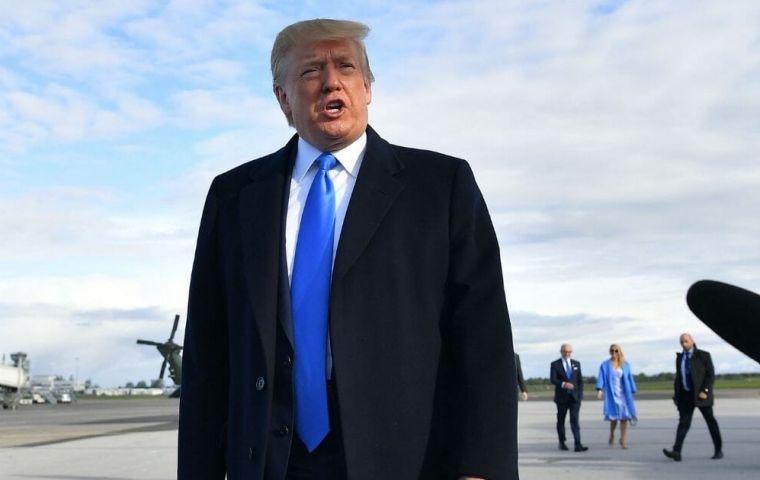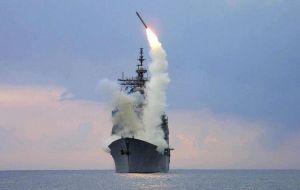MercoPress. South Atlantic News Agency
Iran conflict: Trump “cocked and locked”, but proved the dove among his hawkish advisors
 Trump's decision to cancel what he said was a planned attack on three sites suggests he wants a diplomatic solution to end weeks of festering tensions with Iran
Trump's decision to cancel what he said was a planned attack on three sites suggests he wants a diplomatic solution to end weeks of festering tensions with Iran  Iranian sources revealed that Trump had warned Tehran via Oman that a US attack was imminent, but had said he was against war and wanted talks
Iranian sources revealed that Trump had warned Tehran via Oman that a US attack was imminent, but had said he was against war and wanted talks United States president Donald Trump said on Friday he aborted a military strike to retaliate for Iran's downing of an unmanned US drone because it could have killed 150 people, and signalled he was open to talks with Tehran.
An Iranian surface-to-air missile destroyed a US Global Hawk surveillance drone on Thursday. Tehran said the drone was shot down over its territory and Washington insisted it occurred in international airspace over the Strait of Hormuz.
Iranian sources revealed that they also warned the US on two occasions before shooting down the drone.
The incident aggravated fears of a direct military clash between the longtime foes. Oil futures rose more than one per cent to above US$65 per barrel on Friday over worries about possible disruptions to crude exports from the Gulf.
Trump's decision to cancel what he said was a planned attack on three sites suggests he wants a diplomatic solution to end weeks of festering tensions with Iran, which Washington accuses of a spate of attacks on oil tankers in the Gulf region.
“I'm not looking for war, and if there is, it'll be obliteration like you've never seen before. But I'm not looking to do that,” Trump told NBC News in an interview aired on Friday night.
Iranian sources revealed that Trump had warned Tehran via Oman that a US attack was imminent, but had said he was against war and wanted talks. Washington also requested a closed-door UN Security Council meeting on Monday.
In a series of early-morning tweets, Trump said he was in no hurry to launch a strike and that US economic sanctions designed to force Iran to curb its nuclear and missile programs and its involvement in regional wars were having an effect.
“We were cocked & loaded to retaliate last night,” Trump tweeted.
“Ten minutes before the strike I stopped it, not proportionate to shooting down an unmanned drone. I am in no hurry, our military is rebuilt, new, and ready to go, by far the best in the world,” Trump tweeted.
Typically, the US military would seek to target Iranian facilities that could be connected to the shooting down of the American drone. The military would not seek to inflict casualties and although Iranian military casualties could occur in an attack, forecasts such as 150 are normally only rough estimates.
White House national security adviser John Bolton, Secretary of State Mike Pompeo and CIA Director Gina Haspel, along with the rest of Trump's team, favored a retaliatory strike, a senior Trump administration official said.
”There was complete unanimity amongst the president's advisers and DOD (Department of Defense) leadership on an appropriate response to Iran's activities. The president made the final decision,“ said the official.
Trump's decision drew mixed reviews in Washington, with some people criticising him for flinching while others, notably senior Democrats, praised what they saw as restraint.
”A strike of that amount of collateral damage would be very provocative, and I'm glad the president did not take that,“ House Speaker Nancy Pelosi, the top Democrat in Congress, told reporters.
However, Michael Makovsky, a former Pentagon official who heads the Jewish Institute for National Security of America, a think tank that favors strong US-Israeli security ties, said Trump was undermining US credibility.
”Trump has given the impression he lost his nerve,“ Makovsky said in a statement.
Iran's destruction of the US drone was the latest among ever more serious incidents in the Gulf region, a critical artery for global oil supplies, since mid-May.
There have also been explosions on six oil tankers that the US suspects Iran or its proxies of carrying out. Iran has denied any involvement.
After interviewing Trump for NBC's ”Meet the Press“ program, NBC correspondent Chuck Todd said Trump had said he had no preconditions for talks with Iran and was willing to speak to Iranian President Hassan Rouhani or Supreme Leader Ayatollah Ali Khamenei.
News of the Trump message to Iran, delivered through Oman overnight, broke shortly after the New York Times reported that Trump had called off air strikes targeting Iranian radar and missile batteries at the last minute.
”In his message, Trump said he was against any war with Iran and wanted to talk to Tehran about various issues,“ one Iranian official reveales.
”He gave a short period of time to get our response, but Iran's immediate response was that it is up to Supreme Leader Khamenei to decide about this issue.“
A second Iranian official said: ”We made it clear that the leader is against any talks, but the message will be conveyed to him to make a decision.
“However, we told the Omani official that any attack against Iran will have regional and international consequences.”
Khamenei has the last say on all state matters and has ruled out any talks with Washington while Tehran is under sanctions.
From Teheran is was also revealed that Iran gave two warnings before downing a US reconnaissance drone over the Gulf of Oman, the commander of the aerospace arm of the country's elite Revolutionary Guards said on Friday.
“Twice we...sent warnings,” Brigadier General Amirali Hajizadeh said, without specifying the means.
“Unfortunately, when they failed to reply ... and the aircraft made no change to its trajectory ... we were obliged to shoot it down.”




Top Comments
Disclaimer & comment rulesCommenting for this story is now closed.
If you have a Facebook account, become a fan and comment on our Facebook Page!